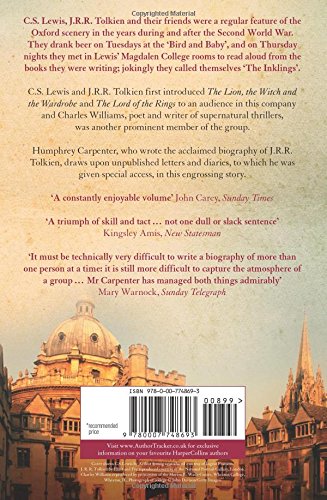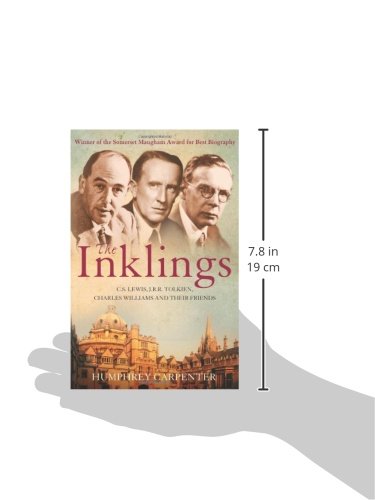Customer Services
Copyright © 2025 Desertcart Holdings Limited




The Inklings: C. S. Lewis, J. R. R. Tolkien, Charles Williams, and Their Friends
A**S
Incomparable Intellects
The Inklings has already achieved renown as a classic study of the literary fraternity centered around J.R.R. Tolkien, C.S. Lewis and Charles Williams. For those who already know something of these authors, it is the rare perspicacious look into the lives and careers of these three men. However, for those not well acquainted, the caricatures of Tolkien and Lewis that developed as a result of their celebrated writings need to be dispelled before seeing why reading the Inklings is worthwhile.Tolkien was not merely the author of popular children’s stories. He was also a master of ancient Germanic languages and lore, an important interpreter of Beowulf and a devout Roman Catholic. In fact, he viewed his fiction as a method of providing young readers with a mythology that could serve as a propaedeutic to Christianity. His genius was of an almost unparalleled level. He and his sons would go for walks in the woods where they would play chess by remembering where all the pieces were in their mind.Lewis was no slouch by comparison. He wrote his Narnia series as an allegory of the Christian narrative. He wrote volumes upon volumes of Christian apologetics. And he was a masterful professor of English literature at both Oxford and Cambridge. His examinations of undergraduates were legendary for the clear thinking and well reasoned arguments he demanded of his students.These figures really should be regarded as towering intellects of the twentieth century. Because of the decline in interest in the humanities their truly groundbreaking contributions to humankind are not fully recognized. But hopefully, as their writing stands the test of time and the liberal arts awaken from their identity obsessed slumber, they’ll be reestablished as the giants of intellect they truly were.
B**T
Wonderful insights into Lewis and the Inklings
During the 1930s at Oxford, C. S. Lewis, J. R. R. Tolkien, and Charles Williams were remarkable friends, writers, and scholars and met regularly to discuss philosophy and literature and to read aloud from their own works in progress. Calling themselves the Inklings, their circle grew. It was in this company that such classics as The Lord of the Rings, The Screwtape Letters, and The Lion, the Witch, and the Wardrobe first found an audience.Author Humphrey Carpenter was born in Oxford and was acquainted with Tolkien, Hugo Dryson, and several other Inklings. In this remarkable reconstruction of their meetings and momentous friendships, Carpenter brings to life those warm and enchanting evenings in Lewis' rooms at Magdalen College, when their imaginations ran wild. His account offers exciting insights into the influence these brilliant individuals had on each other's developing ideas and writing.Brother Albert
W**S
Fragmented but enjoyable
The book was an attempt to show the different personalities and diversity of thought in the group that made up the Inklings. Thou I enjoyed the bios on the lesser known members of the group much of the info on Lewis and Tolkien was not new and there was somewhat of an over balance on the side of Lewis. The imagined Inklings meeting at the end was well done and did serve to draw much of the fragmented book together but seemed like an afterthought.
B**N
An Inside-Out Look at Great Writings and Their Authors!
You would think that writers like C.S. Lewis and J.R.R. Tolkien would fit the image we have of most writers. You would think they simply sat down and penned their works, turned them over to an editor and published them. That was hardly the case.C. S. Lewis, J.R.R. Tolkien, and Charles Williams and other friends--all of them scholars--began to meet regularly on Thursday evenings in Lewis's room at Magdalene College at Oxford. These gatherings were to provide sessions for the readings of their works in progress, as well as discussions (not limited to them, but philosophical or otherwise) in an atmosphere which embraced no rules--no agenda. They called themselves "The Inklings." The "regulars" of the group were included C. S. Lewis, J. R. R. Tolkien, Owen Barfield, Charles Williams, Christopher Tolkien, Warren Lewis, Hugo Dyson, Lord David Cecil, Roger Lancelyn Green, Adam Fox, R. A. Havard, J. A. W. Bennett, and Nevill Coghill. There were many less frequent attendees and visitors. They met for almost two decades. Later, they also began to have "pub" meetings at midday on Tuesdays. The Inklings provided a backdrop and the first audiences for some of the famous works we know such as The Lion, the Witch and the Wardrobe, The Screwtape Letters, and Lord of the Rings.This book provides a rare insight into the lives of these men that was not otherwise known. Humphrey Carpenter knew a number of the Inklings and was able to reconstruct the habitual environment surrounding these meetings and recreate their friendships for us.I recommend this in general to all people who read these authors works, but especially to the lovers of C. S. Lewis and J.R.R. Tolkien.I enjoyed this on audio cassettes.
L**Y
The enduring influence of a group called 'The Inklings'
The story of these three men: Lewis. Tolkien and Charles Williams, as well as Owen Barfield, Neville Coghill, Warren Lewis and others, is told in a well-researchec, lively and personal way. These men had influence on students, readers, hearers, each other and our wider culture - 20th and 21st centuries. From excerpts of poetry, to clarity around personal approaches, this book is interesting page after page.
M**Y
Interesting, Informative, Engaging
Well written and organized, this was an insider look at a cadre of writers I much admire. I recommend it.
B**O
Too copy dense.
Itty, bitty print made it very difficult to read.
W**B
Great read over three amazing men
Great read over three amazing men! It adds a new dimension to LOTR and the Chronicles of Narnia as you get to know more about there writers. It would have been amazing to get be a part of their group!
M**S
Fascinating
Anyone who has enjoyed the books of CS Lewis or JRR Tolkien should read this book. It is an account of the group of friends who gathered around these two for many years in Oxford. They gathered weekly in a pub and in Lewis' rooms in Magdalen College to drink beer (a lot of beer - I am surprised they didn't all die of liver cirrhosis) and read to each other poems, stories and books that they were writing. Without the Inklings we might never have had the "Lord of the Rings", although we would probably have had the Chronicles of Narnia.I found it a fascinating read and have only one or two quibbles. For example, Carpenter does not mention the Evacuees that Lewis and his brother hosted for several years during the Second World War and who provided at least one of the sparks that led on to the writing of "The Lion, the Witch and the Wardrobe". Then on pp 216/7 Carpenter describes the meeting of the Socratic Club in 1948 when Elizabeth Anscombe severely and effectively criticised one chapter of Lewis' latest book of Christian apologetics "Miracles". Carpenter says that Lewis was deeply disturbed and wrote no further books of Christian apologetics for ten years. This is somewhat misleading; Lewis revised the offending chapter in the light of Anscombe's critique and the book was republished (and is still in print).
D**R
Lewis, Tolkien, Williams and others.
Humphrey Carpenter's "The Inklings" charts the lives of the Inklings, and the lifetime of the group itself.It begins with potted biographies of CS Lewis, and Charles Williams. Tolkien's life is alluded to throughout the book, but he doesn't get this level of attention, apparently because Carpenter wrote a more detailed biography of him. This is the one disappointment of the book.We get to see Lewis in a different light. Less the dusty academic and more doing jobs around the house for the older woman he had a complex relationship with. We don't usually associate him with DIY.For me, the potted biography of Williams was really informative. This Inkling is someone we all tend to know much less about. I am reading some of his "supernatural thrillers" and can't help feeling he's been unfairly forgotten.The book then goes on to explain the Inkling meetings at the zenith of their activity, in Oxford in the 1940s. It even goes as far as to "reconstruct" a typical Inklings meeting - featuring reported conversations but fictionalised. This is very illuminating. This is how "Lord of the Rings", "All Hallow's Eve" and much of Lewis's output got developed.Just one word of warning about the book itself - the print is very small and difficult on the eyes. Admittedly I read this book a little too late at night, but the print is still too small for very intense reading.But on the whole, this is a fascinating read.
I**T
Good book but drawn out
Good book but very drawn out.I really enjoyed understanding the backstories to Tolkien and Lewis's relationship/I could have skipped Charles Williams part,but he was in and out of their lives.
L**R
Very interesting read...
I did know some of it already but very enjoyable. See elsewhere on my Profile page for J R R Tolkien: A Biography by Humphrey Carpenter.
T**D
Tolkien's friends
A wonderful evocative biography of the "inklings". Today most people are familiar with Tolkien and C.S. Lewis, but thanks to this book I have discovered the interesting novels of Charles Williams on the theme of the mysterious workings of the universe and transdimensional phenomena.
Trustpilot
1 month ago
1 day ago